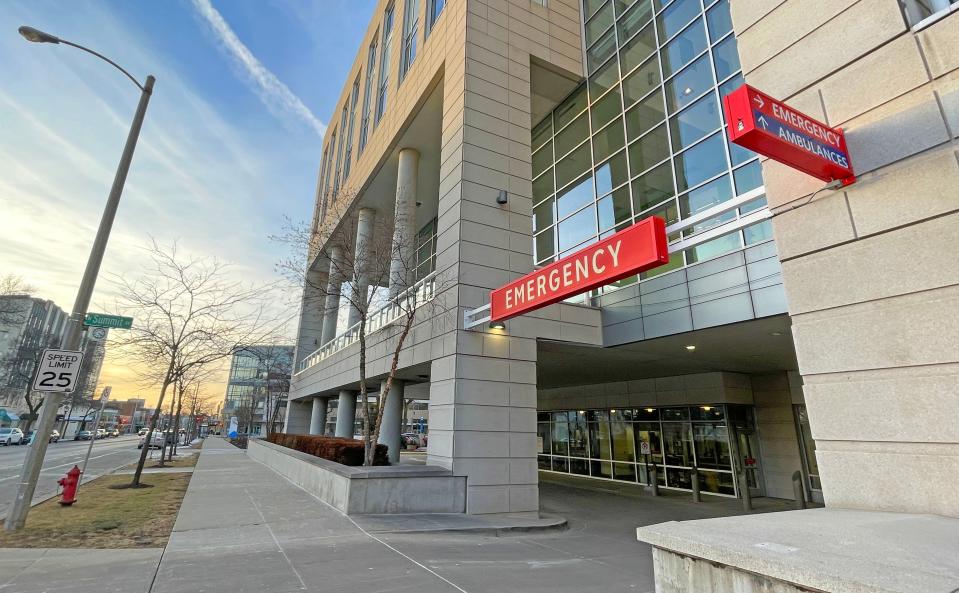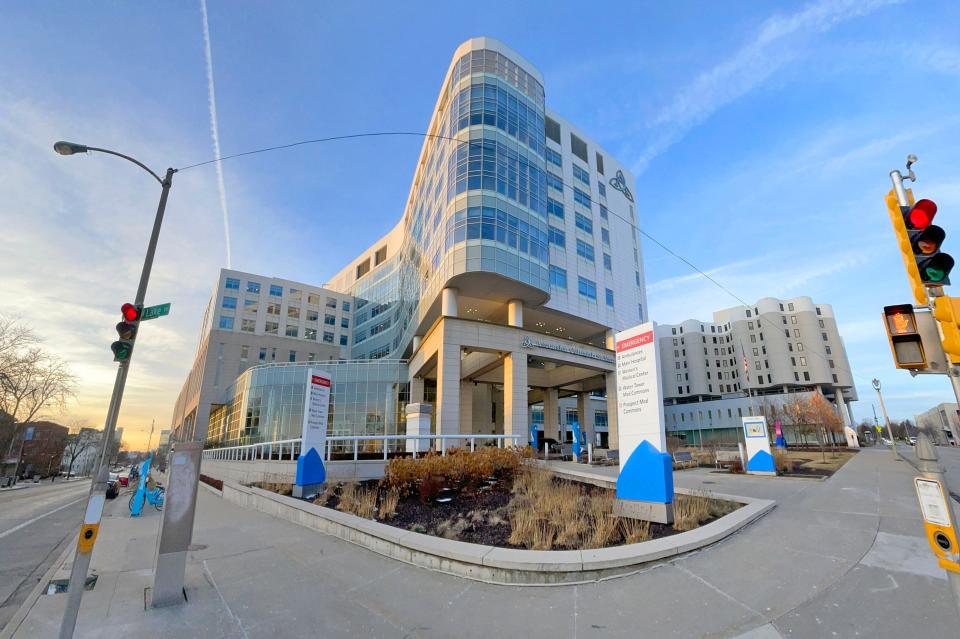What we know about the cyberattack on Ascension hospitals and clinics in Wisconsin, across the U.S.
There is no clear timeline for restoring computer systems disabled by a cyberattack on the national health system Ascension that has resulted in canceled appointments, delays in care and other major disruptions.
The cyberattack has had major repercussions for patients across the 18 states where Ascension operates. The health system has 17 hospitals in Wisconsin, in addition to many clinics and other health care sites, where health care workers still cannot access the medical records system critical for documenting patients' medical history and managing their care.
Here's what we know about the cyberattack that launched Ascension's hospitals and other health care sites into a crisis.
What kind of cyberattack hit Ascension?
The ransomware attack was first detected on May 8, the health system has disclosed. A ransomware attack typically involves cybercriminals locking their target out of computer systems and demanding payment in exchange for returning access. They often steal sensitive information that they then threaten to release as an extortion tactic.

Ascension has not disclosed whether a ransom was paid.
Citing four anonymous sources briefed on the incident, CNN reported that the type of ransomware involved in the attack is called Black Basta, also the name of a group of cybercriminals notorious for using ransomware.
How widespread was the cyberattack on Ascension?
The effects of the cyberattack are systemwide, affecting Ascension facilities in Wisconsin and across the country. Ascension has hospitals and other health care facilities in 18 states.
It is unclear how many people's sensitive information may have been compromised in the attack. The scope of the attack is under investigation.
How has the cyberattack affected Ascension locations?
Health care workers at Ascension hospitals and other facilities do not have access to the electronic medical records system, known as Epic, used to document patients' medical histories and keep track of their conditions, prescriptions, allergies and other important medical information. They generally do not have access to prior lab or test results, health care workers have reported.
Systems used to order certain tests, procedures and medications also are not working, according to Ascension.
Health care workers are using paper records to track patient conditions, write prescriptions and order tests and procedures.
A physician who works at Ascension Wisconsin and spoke on the condition of anonymity for fear of repercussions said doctors are "flying blind" without the medical records system.
"You have no backstory of the person. You don't know what the chief complaint is. You don't know the history of the patient," the physician said. "You’re completely blind."
Some patients' appointments have been cancelled in light of the situation. Ascension has temporarily paused some non-emergent procedures, tests and appointments while the health system works to bring computer systems back online, according to a recent statement.
Some Ascension hospitals have diverted ambulances to other hospitals "to ensure that emergency cases are triaged immediately." Ascension has not specified which hospitals are diverting emergency patients. All Ascension Wisconsin emergency departments are open, the health system said.
Health care workers at Ascension Wisconsin hospitals have reported longer wait times in emergency rooms and long delays in completing scans and imaging.
Also, Ascension retail pharmacies in Wisconsin are not filling prescriptions now, according to recent statements.

When will systems at Ascension be back up and running?
Ascension has not disclosed a timeline for getting its systems back up and running again, saying that "this process will take time to complete."
But on Friday, Ascension issued an update saying "we are hopeful that after the weekend, our patients and clinicians will see progress" across its hospitals, clinics and other sites.
In an email sent to Ascension health care workers on May 9, Ascension CEO Joseph Impicciche said it was "unclear how long it will take to get all systems back on track."
"We are working diligently to resolve the issues as quickly as possible," he wrote in the message.
Another physician who works at Ascension Wisconsin hospitals and who spoke with the Milwaukee Journal Sentinel on the condition of anonymity earlier this month said health care workers were preparing for the situation to last weeks or even months.
What is Ascension doing in response to the cyberattack?
Ascension is working with cybersecurity experts with the firm Mandiant and others to investigate the attack, contain it and help determine what information, if any, was compromised in the attack.
Once the cyberattack was detected, Ascension took steps to contain the damage and urged its business partners to temporarily sever online connections to its system. The health system is working to restore its systems "following a thorough validation and screening process," it said in a statement.
Following the attack, Ascension notified the FBI, the Cybersecurity and Infrastructure Security Agency and the Department of Health and Human Services, according to a recent statement.
The health system also has shared information about the attack with the Health Information Sharing and Analysis Center, a group of health care providers that shares information about cyber threats and physical threats to the health sector.
What advice does Ascension have for patients?
Ascension advised patients with appointments to still go to them unless they hear otherwise from their health care providers. The health system also is encouraging patients to contact their provider before their appointment.
Ascension encourages patients to bring notes on their symptoms and a list of current medications and prescription numbers or prescription bottles so that health care providers can call pharmacies for patients' medications.
The health system noted that patients may experience longer than usual wait times and delays at hospitals, urgent cares and clinics.
How common are cyberattacks on health care institutions?
Cyberattacks are becoming increasingly common in health care, often affecting protected health information along with other data, such as account numbers, Social Security numbers, phone numbers and addresses.
The Health Information Sharing and Analysis Center published an advisory May 10 warning that hackers with Black Basta had recently ramped up attacks against the health care sector.
Another, joint advisory was issued May 10 by the FBI, the Cybersecurity and Infrastructure Security Agency and others, to provide information on Black Basta and urge health care providers to take recommended steps to prevent ransomware attacks.
The advisory says the ransom notes from Black Basta generally do not include an initial ransom demand or payment instructions. Instead, the notes give victims a unique code and tell them to contact the ransomware group on the dark web, a part of the Internet only accessible by a specialized web browser that allows users to remain anonymous and untraceable.
"Typically, the ransom notes give victims between 10 and 12 days to pay the ransom before the ransomware group publishes their data" on the dark web, the advisory says.
The advisory says health care organizations are attractive targets because of their size, their heavy reliance on technology, their access to personal health information and the "unique impacts from patient care disruptions."
In August, hospitals and clinics in the Prevea and the Hospital Sisters Health System in Wisconsin and Illinois were hit by a cyberattack that resulted in systemwide outages and disruptions in care for patients.
Earlier this year, Change Healthcare, part of the health giant UnitedHealth Group, was hit by a cyberattack — one of the worst hacks to hit U.S. health care — that caused widespread disruptions in payments to doctors and health facilities. UnitedHealth ended up paying a ransom of $22 million in cryptocurrency, its CEO told a Congressional committee earlier this month.
UnitedHealth was lambasted in Congressional hearings for the cyberattack and a lack of security measures to keep hackers from compromising sensitive patient data. The incident raised questions about the vulnerability of the health care sector to cyberattacks.
This article originally appeared on Milwaukee Journal Sentinel: What we know about the cyberattack on Ascension hospitals in Wisconsin

